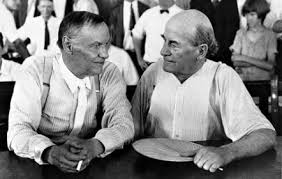Category: Science
-
Big Science Questions and the Gospel, Part IX, Free Will
Free will is one of those issues where you have to think deep and hard about your definitions. Many philosophers will subscribe to one definition, but not another, so sometimes the whole debate on whether we have “free will” revolves around semantics that you can’t do justice to in a single post, so I won’t…
-
Big Science Questions and the Gospel, Part VIII, Time and God
When I was a Wikipedia editor years ago the Joseph Smith page stated that “[Smith] began teaching that God was…embodied within time and space,” and they cited Busman’s statement to that effect. I removed the “embodied in time” and explained that this is arguable, citing Alma’s statement that “time only is measured unto men.” (As…
-
Big Science Questions and the Gospel, Part VII: Fine Tuning
The more I examine the universe and the details of its architecture, the more evidence I find that the universe in some sense must have known we were coming.-Freeman Dyson As noted in a previous post, fine tuning is a problem that has received mainstream acceptability within the scientific community. To summarize, for complex matter…
-
Big Science Questions and the Gospel, Part VI: The End of the Universe and Getting Out of Bed in the Morning
There are a variety of “end of the universe” scenarios that physicists currently see as most likely: Heat Death Because of a mysterious energy in the universe (aptly named “dark energy”), the universe’s expansion is speeding up. As things expand they cool down, so the heat contained in the universe will gradually dissipate until there…
-
Big Science Questions and the Gospel, Part V: Population Genetics
Population genetics is an exciting, cutting edge area of research. In the past we had a fairly simplistic picture of our deep history, with humans migrating out of Africa and then sequentially expanding from continent to continent. However, occasional findings of very early human remains, combined with the genetics revolution, paints a completely different picture…
-
Big Science Questions and the Gospel, Part IV: Quantum Mechanics
Quantum mechanics makes absolutely no sense. Basically, small particles act differently depending on whether they are being watched, either by a conscious human being or a detector machine (even if the detector is turned on after it has acted). I’m not going to rehash how we know, but the more details you get the more…
-
Big Science Questions and the Gospel, Part III: The Creation of Life
Like most Latter-day Saints, my testimony of the Church is based more on the numinous than the intellectual. However, I still remember the moment when, ruminating on my AP biology class while taking a break during my summer lifeguarding job, I decided that there is no way life could have just spontaneously happened, and that…
-
Big Science Questions and the Gospel, Part II: Consciousness and the Soul
Any reasonably intelligent person can understand the principles involved in the search for extraterrestrial life issue that I addressed in my last science post. However, the issue of consciousness is fundamentally mind-wracking and forces us to question some of our basic intuitions. It can get crazy; with some philosophers going so far as to claim…
-
The Gospel and Cutting Edge Science, Part I: The Other Children of God
“John saw curious looking beasts in heaven, he saw every creature that was in heaven, all the beasts, fowls, & fish in heaven, actually there, giving glory to God. I suppose John saw beings there, that had been saved from ten thousand times ten thousand earths like this, strange beasts of which we have no…
-
“Adam shall come to visit”
Charles Darwin’s niece once told her son (the famed British composer Ralph Vaughan Williams) that: “The Bible says that God made the world in six days, Great Uncle Charles thinks it took longer: but we need not worry about it, for it is equally wonderful either way.”[1] While it is wonderful either way, since the…
-

Quodlibet: Vaccination
Whereas disease, as now with COVID-19, causes death to many and harm to many more, and worsens poverty and hunger even among those it does not strike directly, and causes fear in those who await infection and its consequences, and inflicts sorrow and grief on those who lose family and beloved friends; while Jesus, in…
-

Trials, Tribulations, and a Movie: An LDS-themed Discussion of the Coen Brothers’ A SERIOUS MAN
A well-known axiom in both life and storytelling states that the matters we find most personal are also the most universal. Whether it’s film, literature, or some other medium, stories with the most specific and distinctive settings and points of view are usually those an audience will find most relatable. In the words of Robert…
-

Floating Through a Billion Years of Mormon History
Well, a billion years of geological history and a couple hundred years of Mormon history. That’s what I saw last month on a rafting trip down the Colorado River through the Grand Canyon. But not everyone sees the same thing.
-
For the Beauty of the Earth
The latest move by the Church on the environmental front is the production of a beautiful, 94 second spot on the Mormon Channel.
-

Mormonism at the Scopes Trial
I read Edward J. Larson’s Summer for the Gods: The Scopes Trial and America’s Continuing Debate Over Science and Religion (Harvard Univ. Press, 1997) earlier this month, and was surprised to see the Book of Mormon appear in one of Clarence Darrow’s arguments to the court. Funny how little mention there is of the Scopes…
-
Earth Stewardship: Doctrine, Principle, or Heritage?
I was recently told that earth stewardship is not a doctrine nor a principle of the gospel; rather, it is a heritage.
-

Just because you heard it at church, doesn’t make it true.
Or mean that you must repeat it. Because sometimes people say things in church are are just plain not true.
-
The Day Creationism Died
It was January 5, 1982, the day United States District Court Judge William R. Overton issued his memorandum opinion in McLean v. Arkansas Board of Education. Plaintiffs challenged an Arkansas statute that required Arkansas public schools to “give balanced treatment to creation-science and evolution-science.” The Court found that “creation science has no scientific merit or…
-
Science, Mormonism, Dialogue
The good news: There is more room for dialogue between science and Mormonism than between science and other conservative Christian viewpoints. Most Latter-day Saints don’t feel threatened by science. The bad news: Some Latter-day Saints do come to see the relation between science and Mormonism as one of conflict rather than dialogue, and sometimes science…
-

Science as Friend or Foe
On a recent long drive, I listened to all 12 lectures of a Science and Religion audio book by Professor Lawrence Principe of Johns Hopkins. A topic of personal interest (see my earlier T&S series here, here, here , and here), the science-religion issue should also be more of an interest to LDS scholars and…
-

Stewards of Prudence and Altruism
Prudence and altruism combined allow us to delay personal gratification or even make sacrifices for the benefit of future people who have not yet been born. The hearts of the fathers must turn to their children
-

God and Galaxies
Elder Ballard started out his recent Conference talk “This Is My Work and My Glory” with this description and commentary on the wonder of the night sky: A few weeks ago, on a cold, dark winter’s night, my wife, Barbara, and I looked in awe up at the sky. The millions of stars seemed exceptionally…
-
Guest Post: Mental Health, Mortal Life, and Accountability Part 5: The “Greater Sin”/ Sane Repentance & Forgiveness
[This is the fourth in a series of guest posts on Mental Health, Mortal Life, and Accountability. The first three installments are available here: Part 1:”Exceeding Sorrowful, Even Unto Death” (Mark 14:34), Part 2: Causes and (Mis)Attributions, Part 3: Fractured Images of God, Self, and Others, and Part 4: Accommodations in LDS Activities and Meetings] Now knowing…
-
Guest Post: Mental Health, Mortal Life, and Accountability Part 4: Accommodations in LDS Activities and Meetings
[This is the fourth in a series of guest posts on Mental Health, Mortal Life, and Accountability. The other installments are available here: Part 1:”Exceeding Sorrowful, Even Unto Death” (Mark 14:34), Part 2: Causes and (Mis)Attributions, Part 3: Fractured Images of God, Self, and Others, and Part 5: The “Greater Sin”/ Sane Repentance & Forgiveness] During graduate school (in a different…
-
Guest Post: Mental Health, Mortal Life, and Accountability Part 3: Fractured Images of God, Self, and Others
[This is the third in a series of guest posts on Mental Health, Mortal Life, and Accountability. The other installments are available here: Part 1:”Exceeding Sorrowful, Even Unto Death” (Mark 14:34), Part 2: Causes and (Mis)Attributions, Part 4: Accommodations in LDS Activities and Meetings, and Part 5: The “Greater Sin”/ Sane Repentance & Forgiveness] I appreciate the input and insights from…
-
Guest Post: Mental Health, Mortal Life, and Accountability Part 2: Causes and (Mis)Attributions
[This is the second in a series of guest posts on Mental Health, Mortal Life, and Accountability. The other installments are available here: Part 1:”Exceeding Sorrowful, Even Unto Death” (Mark 14:34), Part 3: Fractured Images of God, Self, and Others, Part 4: Accommodations in LDS Activities and Meetings, and Part 5: The “Greater Sin”/ Sane Repentance & Forgiveness] The church’s…
-
Guest Post: Mental Health, Mortal Life, and Accountability Part 1:”Exceeding Sorrowful, Even Unto Death” (Mark 14:34)
[This is the first in a series of guest posts on Mental Health, Mortal Life, and Accountability. The subsequent installments are available here: Part 2: Causes and (Mis)Attributions, Part 3: Fractured Images of God, Self, and Others, Part 4: Accommodations in LDS Activities and Meetings, and Part 5: The “Greater Sin”/ Sane Repentance & Forgiveness] Not many years…


